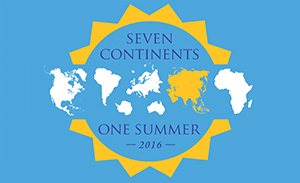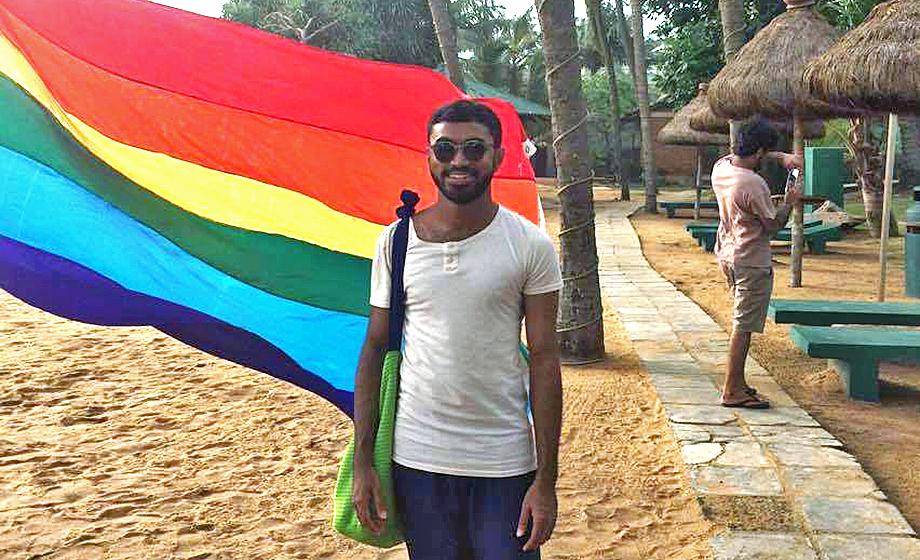
Themal Ellawala ’17, a psychology major at Clark University, returned to Sri Lanka this summer to research how culture, gender norms and stigma affect non-heterosexuals in the island nation where he grew up.
Ellawala (pictured above) is interviewing lesbian, gay, bisexual, transgender, queer and others (LGBTQ+) who fall under this “non-heterosexual” umbrella in and near Colombo, the largest city in Sri Lanka. His research – which is supported by Clark’s Steinbrecher Fellowship as well as the Simon and Eve Colin Award for Undergraduate Creativity in Psychology – confirms how sexual minorities in Sri Lanka have “suffered through in silence” as they experience “multiple forms of oppression,” he says.
Such oppression is very real to Ellawala, who identifies as queer.
“I’ve experienced intolerance and bigotry firsthand,” he says. This includes “the bullying that occurs in schools, the lack of awareness about sexuality, the feeling of isolation, the fear that something is wrong with you.”
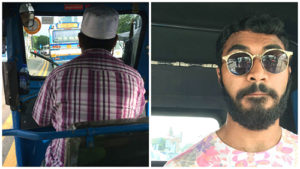
Born in England, Ellawala moved to Sri Lanka when he was 2. The son of physicians who worked in the public health system, he attended Colombo’s Royal College, which he describes as “this really old and prestigious all-male school, established during British colonial rule and modeled after Eton.”
There, he “chafed under the constraints of the more rigid British education system” and experienced a lack of “sensitivity to differences.” As a result, he sought “a more liberal academic culture” in the United States – and landed at Clark.
“It was the exposure to radical thinkers in the Clark community that forged me into the political being I am today,” Ellawala says. Clark “taught me to be patient with incremental change and to realize the power in thoughtful, compassionate action” and “showed to me the possibility of crafting a career out of something that I am deeply passionate about.”
Among the faculty who have inspired him is Abbie Goldberg, associate professor of psychology. She studies gender and sexual orientation in human development and mental health. As his research adviser, Goldberg has been “a staunch advocate,” says Ellawalla, who thanks her for “being as passionate about this study as she is.” Because he’s working with human subjects, Ellawala also sought the advice of James P. Elliott, chair of Clark’s Institutional Review Board and professor and chair of English, who, he says, provided “thoughtful support in ensuring the ethicality of this research.” Meanwhile, Ellawala says, Esteban Cardemil, associate professor of psychology, has served as “an incredible mentor and the most dependable source of advice.”
In Sri Lanka, Ellawala’s research collaborator is Damith Chandimal, a graduate student in gender and women’s studies at the University of Colombo. Malathi de Alwis, a well-known feminist scholar, activist and visiting lecturer at the University of Colombo, connected the two.
Questions and answers about Ellawala’s research
Below, Ellawala talks more about his research topic, as well as his plans for this year and beyond.
Why does this topic interest you? Why is this research important?
As a Sri Lankan who identifies as queer, I’ve experienced intolerance and bigotry firsthand. The bullying that occurs in schools, the lack of awareness about sexuality, the feeling of isolation, the fear that something is wrong with you, the worry that you are a result of bad karma or God’s punishment, the exposure to risky sexual practices, the desperation to experience love and intimacy in a society that profits from selling romance novels and soap operas to the public, the fear of being blackmailed or outed to your family, being forced into a heterosexual marriage, harassment by state officials and strangers on the street, seeking ways to end one’s life, these are everyday experiences for someone who doesn’t fit into society’s framework of love and intimacy.
There needs to be a more robust dialogue about sexuality, and how there is no such thing as normative sex. Discourse needs to question the emphasis on the (heterosexual) nuclear family that is propounded by British colonial values, traditional cultures and development agendas of the international community. My reasons for committing to this research, as well as choosing to devote a career to it, are both intensely personal and exceedingly political.
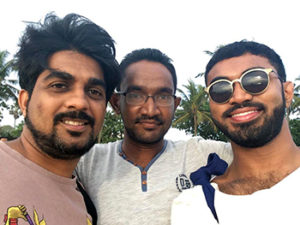
Can you elaborate more on your research?
I think it would be fair to say that this is the first ethnographic study of non-heterosexuality in Sri Lanka. While several studies which fall within the rubric of what we would term LGBTQ+ studies have occurred in the past, many of them have focused exclusively on experiences of discrimination.
I believe that it’s important to study sexuality, what it is and how it is defined by various people, groups and subcultures. Understanding what exactly people are being discriminated against is, in my opinion, a crucial precursor to making sense of the discriminatory experiences and the response victims have to these.
How do you aim, as you describe it, “to create a research paradigm for studies of sexual minorities”? And what do you mean by “sexual minorities”?
A study that explores how people experience desires, engage in sexual activity, make sense of these experiences and identify could be very valuable in crafting research projects that are more culturally informed and better target needs in various communities.
I am hoping that my study would contribute toward a basic understanding of non-heterosexual desires and behaviors in Sri Lanka, which I and other researchers can utilize to conduct deeper explorations and lobby for social change.
The term “sexual minorities” refers to anyone who is not exclusively heterosexual.
How do you identify yourself?
What are the latest terms that people use to identify their sexual orientation, gender, race and more? Clark University’s Office of Diversity and Inclusion maintains a Diversipedia of such terms, available online as a PDF. “This is a living document!” the office notes. “The ODI offers input from students, faculty and staff.”
Why do you use the term “non-heterosexual”?
This question gets to the heart of my study. My academic work and personal beliefs derive from a philosophy and epistemological standpoint that much of what we experience in the world is constructed by collectives of individuals, and social institutions. Sexuality would be one such construct.
An aim of my study is to explore how people [in Sri Lanka] who experience sexual desires and behaviors that are non-heterosexual may differ from LGBTQ+ communities in the West (I acknowledge that it is a generalization to assume that a uniform system of sexual identity exists in the West). I wish to explore whether people have a sense of sexual identity, and if so, if this identity is understood in ways that are similar to or different from the understanding of LGBTQ+ identities in the West.
One of the reasons for focusing on this topic is because many scholars in the Global South [Africa, Latin America, parts of Asia and the Middle East] have spoken out against homocolonialism, a form of neo-colonialism that assumes a universal sexual identity modeled along a Western framework and imports this idea globally (e.g., the U.S. State Department that fights for the rights of LGBTQ+ communities, HIV prevention and awareness campaigns that target LGBTQ+ communities and sexual behaviors that have been studied in the West or are informed by Western concepts of risk and exposure).
The second reason for adopting this aim is because, to date, no research has been conducted on understanding how people identify and make meaning of their sexuality in Sri Lanka. This lack of a local understanding of sexuality creates a vacuum that NGOs [non-government organizations] and other service providers must fill with the literature and knowledge from the West, of concepts and terms that many not translate over to a Sri Lankan context. I use the term non-heterosexual to be all encompassing, but to also avoid prematurely identifying my subjects within a particular framework.
Have any other academics studied the experience of non-heterosexuals in Sri Lanka?
Yes, there is a smattering of research that has been conducted by other academics. However, many of these studies have occurred through a public health paradigm, which unquestioningly assumes that Western taxonomies of sexuality are relevant across different cultural contexts. Or they have focused on niche themes, and haven’t attempted as much to explore how gender, class and other social locations affect how individuals see their sexuality.
My research, while borrowing from the studies that precede it, aims to complement them and add to a growing body of work.
How are non-heterosexuals/sexual minorities treated in Sri Lanka?
The reasons that motivate this research would have given you some clue to the treatment people experience. There’s so much that is suffered through in silence, like being sexually assaulted by boys at school, being asked to perform sexual favors at the workplace simply to retain their job, being kicked out of home or running away, falling prey to sex work or trafficking, seeing one’s lover being forced into a traditional marriage, being harassed by the police, falling prey to scams, being forced through conversion therapy and being verbally assaulted by medical professionals at STI [sexually transmissible infection] clinics. Nearly every single individual I have interviewed has spoken of an experience of this nature. Indeed, the norm is to have experienced multiple forms of oppression throughout one’s lifetime.
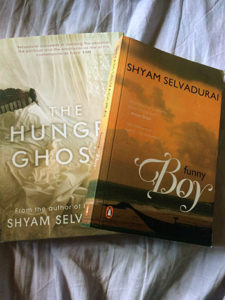
Is there any place in Sri Lanka where non-heterosexuals feel safe and welcome?
Many have mentioned that such safe spaces are few and far between. The emphasis on kinship and family ties means that in general, even after marriage, Sri Lankans live with their families for long periods of time. Thus, many feel trapped even within their own private spaces. There are no official gay bars or clubs, even though some function so on a clandestine basis. Various communities host private parties which are said to be the only space where one can hold hands, dance freely, perform in drag and express oneself fully.
What about the age and gender of sexual minorities: Is it easier for younger LGBTQ+ people to be out than it is for older people? What about men? Women? Transgender people?
The interviews I have conducted so far don’t indicate any major generational differences in the tendency to come out. The one variable that I have noticed so far is social class. My own observations, along with those of my research participants, is that those of upper and upper-middle-class positions are insulated against the more explicit forms of homophobia and bigotry, as a result of their affluence, social connections and level of education. This is not to say that affluent individuals don’t face social pressures and discrimination, but perhaps they do not experience them to the same degree. What distinguishes trans folk from the rest is that their ability to pass under the societal radar is more limited, as there is an external manifestation of their gender identity. Thus, they are targeted at a higher rate than other members of this demographic.
What role does religion play on how non-heterosexuals are treated?
This is one aspect of my study, even though I won’t be doing a deep dive into it. Many of my participants have indicated that they experience a conflict between their religion and their sexuality. Some have elected to resolve this conflict by declaring themselves atheist while others have sought refuge in religion, especially Buddhism, from societal pressures and oppression.
What role does family play?
Family is a significant factor in any Sri Lankan experience, and sexuality is not immune from its influence. It appears that most individuals live in fear of their families finding out, going to extreme lengths to hide their sexuality, even agreeing to enter into a heterosexual marriage. When families discover the secret, it is not uncommon to seek out corrective/conversion therapy, force the individual into a heterosexual marriage, even arrange for corrective rape. This, of course, this is a generalization. There are families that accept it after some time, and even accept partners into the family.
What about the law and government? Are there anti-LGBTQ+ laws in Sri Lanka?
One of the most significant barriers to queer liberation in Sri Lanka is the criminalization of homosexuality, through Sections 365 and 365A. These were introduced as anti-sodomy laws by the British during the colonial period, and have remained in place ever since. While the laws have not been invoked to prosecute any individual, they loom large as a threat over any organizing, activist work or social gatherings. There are documented instances of the police using the laws to harass people and punish them extra-judicially, even extracting bribes and sexual favors.
How does Sri Lanka compare to other countries in terms of how non-heterosexuals are treated?
The curious state of Sri Lankan queer politics is that the oppression of non-heterosexual desires and behaviors is covert, and often times not explicit. This oppression has not reached the stage of public stoning, lynching or the enforcement of the death penalty. It could be said that there is greater tolerance for non-heterosexuals, but this comes at the cost of driving the oppression underground and enabling otherwise well-meaning individuals to look away. As unfortunate as it may be, my belief is that these mounting tensions must culminate in a watershed moment to galvanize queer politics and organize the call for social change.
Is Sri Lanka more open than the U.S. – or not – when it comes to transgender issues?
Such a comparison is difficult to make because everyone’s experiences differ, and levels of tolerance and acceptance vary from one community to the next, in both Sri Lanka and the U.S. What is curious about Sri Lanka is that while there are some well-known social personalities who are openly trans, this awareness and acceptance has not trickled down to other strata of society. Trans-ness is a taboo, a bewildering concept, perhaps because gender norms are far more entrenched. There’s very little transnational queer media that is consumed by these demographics, based on my observations.
What is the most difficult aspect of your research? Are you finding it easy to find subjects who want to talk to you?
One of the most challenging facets aspects of this study is to draw from the experiences of as a diverse a group of people as possible. It is apparently a trend within these demographics for lesbians and trans men to be less visible and active than gay men and trans women. Incorporating the experiences of the former has proved to be difficult. Another complication has been capturing the perspectives of those who may not consider their sexual desires and behaviors to be an integral part of their self. Such individuals tend not be associated with LGBTQ + organizations and would not be interested in participating in a study of this nature.
This story is part of our 7 Continents, 1 Summer series, which highlights the interesting work that Clark students, faculty, alumni and staff are doing all over the world. Have a great story of your own to share? Let us know and we’ll be in touch.
What are you enjoying about your research?
I find the topic, and this field in general, to be fascinating. I have always been interested in the personal experiences of people, especially those who live at the margins of society. This study provides the perfect opportunity to unite my academic interests in postcolonial theory, feminist theory, queer theory and qualitative research. It has been a pleasure to participate in community activities and be active in queer life, an experience I shied away from before I moved to the U.S. and embraced my queer self. Lastly, I feel like I have taken an infinitely tiny step closer to using the (albeit limited) knowledge and skills I have gained through my involvement in social justice work in the U.S. to contribute to change in Sri Lanka.
What do you plan to do with your research? Will it be published or used in some other way?
I hope to publish it, to draw the attention of the international community (e.g. foreign researchers, foreign governments, INGOs [international non-governmental organizations]) to the fact that due attention must be paid to the cultural contexts in which their academic and development work occurs, and how cultures can influence individuals in significant ways. I also hope to disseminate my findings among the local NGOs and counseling service providers in Sri Lanka, to ensure that their work is more culturally informed. Lastly, I hope that this study will be one of many that will lead to a shift in societal attitudes, legal change and justice for people long deprived a place in society.
What other research opportunities have you had at Clark?
I have been involved in several research labs at Clark over the past three years, including Abbie Goldberg’s Diverse Families Lab (research on same-gender families, adoption within these contexts and the experiences of mothers with diverse sexual histories); [Psychology Research Scientist] Laura McKee’s LeafLab (testing a smartphone-based intervention to prevent the onset of depression among adolescents); Esteban Cardemil’s Mental Health, Culture and Community Lab; [Psychology Professor and Chair] James Córdova’s Center for Couples and Family Research; and as a volunteer in the Clark Anti-Violence Education program run through the Psychology Department.
I have published two articles through the Scholarly Undergraduate Research Journal (SURJ): “The Efficacy of Electroconvulsive Therapy in Managing Self-Injurious Behaviors Among Youth with Autism Spectrum Disorder: A Review” (2015) and “Pulling the Trigger: Dehumanization of African Americans and Police Violence” (2016).
I completed a LEEP project last summer, pursuing a two-month-long research internship with Vickie Mays, a leading researcher on health disparities, at UCLA [University of California-Los Angeles]. She and I collaborated on two projects: to assess the gaps in the collection of health data of lesbian, gay and bisexual individuals through major national survey instruments, and to map the impact of systemic racism on the physical and mental health, as well as social wellbeing, of people of color. I will be presenting a poster on the first project at the American Psychological Association’s Annual Convention this August in Denver.
What do you hope to do after Clark?
I am hoping to enter a Ph.D. program in anthropology, area studies or critical studies. My interests lie in exploring gender, sexuality, class and other social positionalities in Sri Lanka and South Asia through the lens of postcolonial theory, feminist theory and queer theory. I am exploring graduate programs in both the U.S. and abroad, and, alas, have not yet decided on a firm course of action.

